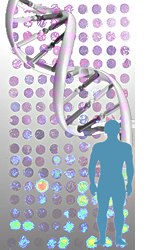
Photo from wikipedia
BACKGROUND The clinical outcomes of noncompaction cardiomyopathy (NCCM) range from asymptomatic to heart failure, arrhythmias, and sudden cardiac death. Genetics play an important role in NCCM. OBJECTIVES This study investigated the… Click to show full abstract
BACKGROUND The clinical outcomes of noncompaction cardiomyopathy (NCCM) range from asymptomatic to heart failure, arrhythmias, and sudden cardiac death. Genetics play an important role in NCCM. OBJECTIVES This study investigated the correlations among genetics, clinical features, and outcomes in adults and children diagnosed with NCCM. METHODS A retrospective multicenter study from 4 cardiogenetic centers in the Netherlands classified 327 unrelated NCCM patients into 3 categories: 1) genetic, with a mutation in 32% (81 adults; 23 children) of patients; 2) probably genetic, familial cardiomyopathy without a mutation in 16% (45 adults; 8 children) of patients; or 3) sporadic, no family history, without mutation in 52% (149 adults; 21 children) of patients. Clinical features and major adverse cardiac events (MACE) during follow-up were compared across the children and adults. RESULTS MYH7, MYBPC3, and TTN mutations were the most common mutations (71%) found in genetic NCCM. The risk of having reduced left ventricular (LV) systolic dysfunction was higher for genetic patients compared with the probably genetic and sporadic cases (p = 0.024), with the highest risk in patients with multiple mutations and TTN mutations. Mutations were more frequent in children (p = 0.04) and were associated with MACE (p = 0.025). Adults were more likely to have sporadic NCCM. High risk for cardiac events in children and adults was related to LV systolic dysfunction in mutation carriers, but not in sporadic cases. Patients with MYH7 mutations had low risk for MACE (p = 0.03). CONCLUSIONS NCCM is a heterogeneous condition, and genetic stratification has a role in clinical care. Distinguishing genetic from nongenetic NCCM complements prediction of outcome and may lead to management and follow-up tailored to genetic status.
Journal Title: Journal of the American College of Cardiology
Year Published: 2018
Link to full text (if available)
Share on Social Media: Sign Up to like & get
recommendations!